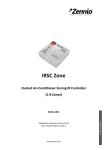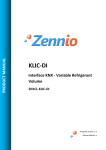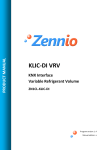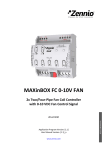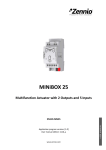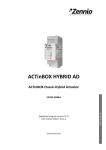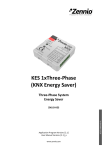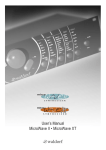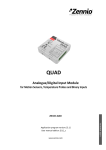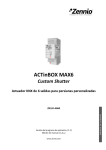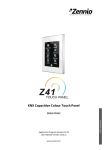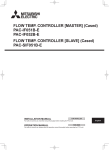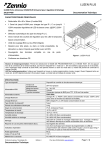Download KLIC-DA LT - Futurasmus KNX Group
Transcript
KLIC-DA LT KNX/DAIKIN Altherma LT Gateway Application Program Version: [1.0] User Manual Version: [1.0]_a www.zennio.com U SER MANUAL ZN1CL-KLIC-DA KLIC-DA LT Contents 1 Introduction ...................................................................................................................... 3 1.1 KLIC-DA ..................................................................................................................... 3 1.1.1 1.2 2 3 KLIC-DA LT.......................................................................................................... 4 Installation ................................................................................................................ 5 Configuration .................................................................................................................... 7 2.1 Domestic Hot Water Management (DHW) ................................................................. 7 2.2 Climate control management .................................................................................... 7 2.3 Error Handling ........................................................................................................... 7 2.4 Additional Indicators.................................................................................................. 8 2.5 Start-up ..................................................................................................................... 8 ETS Parameterisation ...................................................................................................... 10 3.1 Default Configuration .............................................................................................. 10 3.1.1 Configuration ................................................................................................... 11 3.1.1.1 Domestic Hot Water..................................................................................... 13 3.1.1.2 Climate ........................................................................................................ 14 3.1.1.3 Error Handling .............................................................................................. 15 3.1.1.4 Temperatures (Status).................................................................................. 15 3.1.1.5 Actuators (Status) ........................................................................................ 16 3.1.1.6 Additional Information (Status) .................................................................... 17 ANNEX I. Communication Objects ........................................................................................... 18 http://www.zennio.com Technical Support: http://zennioenglish.zendesk.com 2 KLIC-DA LT 1 INTRODUCTION 1.1 KLIC-DA KLIC-DA from Zennio is the ideal solution for the integration of Altherma climate systems into a KNX domotic environment. As a bidirectional KNX / Altherma interface, KLIC-DA provides full communication between any KNX device (e.g., the InZennio Z41 touch screen from Zennio) and the Altherma system, which can therefore be controlled analogously as from the specific Altherma user interfaces. Moreover, any status updates and feedback received from the Altherma system will also be forwarded by KLIC-DA towards other KNX devices. Figure 1. KLIC-DA Daikin Altherma is an integral solution for climate control. Although mainly based on the heat pump technology, Altherma systems can optionally perform cooling as well, therefore providing the user with heating, air-conditioning and domestic hot water. Depending on the structure of the system (e.g.: location of the external unit, integration or not of the hydrobox within the same unit, etc.) and on whether A/C is required or not, different Altherma systems are available. http://www.zennio.com Technical Support: http://zennioenglish.zendesk.com 3 KLIC-DA LT 1.1.1 KLIC-DA LT The KLIC-DA LT application program provided by Zennio focuses on controlling Altherma LT (from Low Temperature) systems, in contrast to the Altherma HT (from High Temperature) systems. An Altherma LT system consists of a series of elements (an external unit, a hydrobox, an internal unit, the user interfaces, etc.), and the specific “P1/P2” communication bus, which allows the user interfaces (typically, one acting as the main control and the other as an additional control) communicate to each other and to the Altherma system. Note: only the main interface interacts with the Altherma LT system. Any order from / to the additional interface will reach the main interface too. KLIC-DA is meant to replace the aforementioned additional interface, and thus to communicate only to the main interface and not to the Altherma LT system directly. The main functions performed by the KLIC-DA LT application program are: Management of the domestic hot-water (DHW) system. Management of the room climate system (Leaving Water Method). Error handling. Simultaneous monitoring of multiple indicators (temperature setpoints, actuator states, sensors…) reported by the Altherma system. On the other hand, Altherma LT systems feature three climate control methods: Control of the leaving water temperature (LWT), Control through a user interface configured as a thermostat, Control though an external thermostat (TH). The KLIC-DA LT application program is only compatible with Altherma LT systems configured for an LWT control, and with only one climate zone (Altherma LT systems permit up to two climate zones with independent setpoint temperatures). http://www.zennio.com Technical Support: http://zennioenglish.zendesk.com 4 KLIC-DA LT 1.2 INSTALLATION 1 1.- KNX Connector 2.- Programming LED 3.- Programming Button 4 2 4.- Two-wire Communication Terminal 3 Figure 2. Element Diagram KLIC-DA connects to the KNX bus via the corresponding built-in terminals (1). On the other hand, this device needs to be connected to the P1/P2 bus of the Altherma system (4) in substitution of the original additional user interface. Once the device is being powered from the KNX bus, both the physical address and the KLIC-DA LT application program can be downloaded. This device does not need any additional external power as it is entirely powered through the KNX bus. The functionality of the remaining elements is as follows: Programming Button (3): a short press on this button will set the device into the programming mode, making the red component of the LED (2) indicator light up. If the button is held while plugging the device into the KNX bus, KLIC-DA will go into the safe mode, making the red colour of the LED blink intermittently. LED Indicator (2): this three-colour (red, blue and green) light indicator reflects the current state of the device. Apart from showing whether the device is under the programming or safe modes, this LED will also react to any communication between KLIC-DA and the P1/P2 bus, which may be useful during the installation process. The meaning of the different colour components is explained next: http://www.zennio.com Technical Support: http://zennioenglish.zendesk.com 5 KLIC-DA LT Red Component (still): KLIC-DA is under the programming mode. Red Component (blinking): KLIC-DA is under the safe mode. Green Component (still): KLIC-DA is not connected to the Altherma system, or the latter is disconnected from the power supply. Green Component (blinking): transmission or data from the P1/P2 bus towards KLIC-DA. Blue Component (blinking): transmission or data from KLIC-DA towards the P1/P2 bus. Note: each colour component works with independence of the others. Therefore, if for instance KLIC-DA is under the programming mode being the Altherma system disconnected, the effective colour will be orange (still), as the red and green components will be lighting (still). Input Terminal for the Two-Wire Communication Cable (4): slot for the connection of the two-wire communication cable that will connect KLIC-DA to the Altherma P1/P2 bus. A. Hydrobox Unit. B. Main User Interface. C. KLIC-DA. Figure 3. Connection to the P1/P2 bus As stated in 1.1.1 and shown in Figure 3, KLIC-DA needs to be installed in substitution of the original additional user control, while the main user control needs to be configured as “At Unit” under “User Interface Location”. For detailed information about the technical features of KLIC-DA, as well as on security and installation procedures, please refer to the device Datasheet, bundled within the original packaging of the device and also available at http://www.zennio.com. http://www.zennio.com Technical Support: http://zennioenglish.zendesk.com 6 KLIC-DA LT 2 CONFIGURATION As stated in section 1.1.1, the KLIC-DA LT application program is only compatible with Altherma LT systems running under an LWT control, and with only one climate zone. The main functionality of KLIC-DA LT is listed next. 2.1 DOMESTIC HOT WATER MANAGEMENT (DHW) In relation to this function, KLIC-DA LT permits controlling and monitoring: The ON/OFF state of the DHW function, The ON/OFF state of the Buster mode, The setpoint temperature of the DHW tank, It can also report whether the DHW tank is currently under operation or not. 2.2 CLIMATE CONTROL MANAGEMENT In relation to this function, KLIC-DA LT permits controlling and monitoring: The ON/OFF state of the climate function, The Operation Mode of the climate system, The setpoint temperature of the climate control, It can also report whether the climate system is currently under operation or not. 2.3 ERROR HANDLING KLIC-DA LT is able to report the following error events: Duplicate additional user interface (KLIC-DA is supposed to replace it), Malfunction of the Altherma system. http://www.zennio.com Technical Support: http://zennioenglish.zendesk.com 7 KLIC-DA LT 2.4 ADDITIONAL INDICATORS KLIC-DA LT does monitor other information received from the Altherma LT system, and therefore is able to report it to the KNX bus: Temperatures (an external temperature or that of the DHW tank, the output water flow, the input water flow or of the refrigerant). State of the actuators (pump, compressor, backup heaters…). Additional information (water flow, electrical consumption to date, energy production to date). 2.5 START-UP Both user interfaces in the Altherma system (i.e., the main control and the additional control) are powered from the P1/P2 bus. In addition, when the whole Altherma system is switched on, the main control collects information on the status of the installation and then shares it with the additional control. KLIC-DA, however, is powered from the KNX bus instead of the P1/P2 bus. Therefore, it may initialise at a different moment than the main control, so it is advisable to restart the Altherma system after installing KLIC-DA and downloading the application. Notwithstanding the above, in order to guarantee consistency between the actual status of the system and that of the communication objects sent to the KNX bus (which will not lose their values after a power failure), whenever KLIC-DA establishes communication with the main control, it will send the appropriate commands so the Altherma system switches to the last status the domotic system is aware of. 1. Once KLIC-DA gets at least one valid frame from the Altherma system, KLICDA will send a reset order (it will have no effect if the Altherma system is already running the initial communication sequence). 2. During the initial communication sequence (~30 seconds), the main user control will show the word “Busy”. 3. A few more seconds after the initial communication sequence, KLIC-DA will send the proper orders to switch the Altherma system to the status it was aware of prior to the power failure (or to the factory defaults, on the very first start-up). http://www.zennio.com Technical Support: http://zennioenglish.zendesk.com 8 KLIC-DA LT 4. Any communication object received from the KNX bus during the previous stages will be taken into account by KLIC-DA, which will in fact update the status of the Altherma system –after the initial sequence– according to them. The above sequence occurs whenever KLIC-DA powers up, or detects communication errors with the P1/P2 bus. It also takes place when the Altherma system itself restarts the communication, for example after a configuration change from the main control. Finally, the KLIC-DA LT application program brings the option to send all the status objects to the KNX bus after a voltage recovery, in order to update other KNX devices. http://www.zennio.com Technical Support: http://zennioenglish.zendesk.com 9 KLIC-DA LT 3 ETS PARAMETERISATION To begin with the parameterisation process of the KLIC-DA interface it is necessary, after launching the ETS program, to import the database of the product (KLIC-DA LT application program). Next, the device should be added to the project. And then, one right-click on the device will permit selecting "Edit parameters", in order to start the configuration. In the following sections a detailed explanation is provided about how to parameterise the different functionalities of the device in ETS. 3.1 DEFAULT CONFIGURATION This section shows the default configuration the device configuration starts from. Note that no communication objects are enabled by default, so the device topology will show up empty. Regarding the parameter window, only one main tab (“General”) is shown, containing one sub-tab called Configuration. The following section describes all the parameters available under Configuration. Figure 4. The "Configuration" parameter window, under "General". http://www.zennio.com Technical Support: http://zennioenglish.zendesk.com 10 KLIC-DA LT 3.1.1 CONFIGURATION In the first place, it is necessary to set the desired Configuration Type, which can be one of the following: Basic, selected by default. This mode permits enabling and making use of the following options: Domestic Hot Water (DHW), which enables or disables the DHW function. See section 3.1.1.1. Climate, which enables or disables the room climate function. See section 3.1.1.2. Error Handling, which enables or disables the error monitoring function. See section 3.1.1.3. Advanced. While all of the above will still remain available, this mode brings a few more options: Figure 5. Advanced Configuration Type Temperatures (Status), which enables or disables the supervision of various temperature indicators. See section 3.1.1.4 Actuators (Status), which enables or disables the supervision of various indicators related to the operational condition of the actuators (pump, compressor, etc.) in the Altherma LT system. See section 3.1.1.5. http://www.zennio.com Technical Support: http://zennioenglish.zendesk.com 11 KLIC-DA LT Additional Information (Status), which enables or disables the supervision of a set of indicators related to the power consumption/production and to the water flow. See section 3.1.1.6. Depending on the Altherma LT system being interfaced, the checkboxes of the required functions need to be marked. This will make some communication objects visible, as described in the following sections of this user manual. One more parameter should be configured: Send Status Objects on Bus Voltage Recovery?, which may be set to one of the following: No (default): no objects will be sent to the KNX bus during the device start-up after a bus power failure or a download from ETS. Yes: the following objects will be sent to the KNX bus (to update other KNX devices) when the device starts up after a bus power failure or a download from ETS: [DHW] On/Off (Status) [Temperatures] Leaving water (PHE) [DHW] Booster mode On/Off (Status) [Temperatures] Inlet water [DHW] Temperature (Status) [Temperatures] Refrigerant [DHW] Operating (Status) [Actuators] Pump [Climate] On/Off (Status) [Actuators] Compressor [Climate] Operation mode (Status) [Actuators] BUH: step 1 [Climate] Temperature (Status) [Actuators] BUH: step 2 [Climate] Operating (Status) [Addit. Info.] Flow rate [Temperatures] DHW tank [Addit. Info.] Electrical energy consumpt. [Temperatures] Outdoor Temperature [Addit. Info.] Energy production [Temperatures] Leaving water It is possible to apply a certain delay (0 to 255 seconds) to the above sending once the device start-up is over. Therefore, a new parameter called Sending Delay will show if the above is set to “Yes”. Regarding the start-up of the device, it is advisable to read section 2.1, as it contains details on how the interaction between KLIC-DA LT and the Altherma LT system starts. http://www.zennio.com Technical Support: http://zennioenglish.zendesk.com 12 KLIC-DA LT 3.1.1.1 DOMESTIC HOT WATER No additional parameter configuration is required for this function. If enabled, the following communication objects will be available: [DHW] On/Off: one-bit object that will make KLIC-DA LT turn on the DHW function if a “1” is received from the KNX bus, while one “0” will make it turn the function off. [DHW] Booster Mode On/Off: one-bit object that will make KLIC-DA LT switch on the Booster mode of the DHW tank if a “1” is received from the KNX bus, while one “0” will make it turn this mode off. Note: the commands to activate/deactivate the Booster mode are only sent if the DHW function is active. [DHW] Temperature: two-byte object that sets the desired setpoint temperature for the DHW tank. In case the value received through this object exceeds the maximum temperature set in the main user interface, KLIC-DA LT will truncate it and send the Altherma LT system the maximum permitted setpoint. On the other hand, in case the value is under the minimum permitted value, the Altherma LT system itself will truncate it and apply the minimum setpoint value, notifying afterwards the effective change to KLIC-DA LT. [DHW] On/Off (Status): one-bit object that reflects whether the DHW function is on (value “1”) or off (value “0”). [DHW] Booster Mode On/Off (Status): one-bit object that reflects whether the Booster Mode is currently on (value “1”) or off (value “0”). [DHW] Temperature (Status): two-byte object that reflects the current setpoint temperature of the DHW tank. [DHW] Operating (Status): one-bit object that shows whether the Domestic Hot Water tank is in operation (value “1”) or not (value “0”). Note that the tank will never be in operation if the DHW function itself has not been turned on. Whenever the Altherma LT system notifies a status change, the corresponding status object will be automatically sent by KLIC-DA LT to the KNX bus. http://www.zennio.com Technical Support: http://zennioenglish.zendesk.com 13 KLIC-DA LT 3.1.1.2 CLIMATE No additional parameter configuration is required for this function. If enabled, the following communication objects will be available: [Climate] On/Off: one-bit object that will make KLIC-DA LT turn on the climate control function when a “1” is received from the KNX bus, while one “0” will make it turn the climate control function off. [Climate] Operation Mode: one-bit object that will make KLIC-DA LT switch the current operation mode of the climate system to Cooling (value “0”) or to Heating (value “1”). Note: although available from the main user control, the “automatic” mode cannot be activated from KLIC-DA LT. If a mode switch order is received from the KNX bus, KLIC-DA LT will ensure that the automatic mode gets deactivated in the climate system. [Climate] Temperature: two-byte object that sets the desired setpoint temperature for the climate system. In case the value received through this object exceeds the allowed setpoint range, the Altherma LT system itself will truncate it to the minimum or maximum values, notifying afterwards the effective change to KLIC-DA LT. [Climate] On/Off (Status): one-bit object that reflects whether the climate system is currently on (value “1”) or off (value “0”). [Climate] Operation Mode (Status): one-bit object that reflects the currently active operation mode (“0” = Cooling; “1” = Heating), no matter if the automatic mode has been set or not from the main user control. [Climate] Temperature (Status): two-byte object that reflects the current setpoint temperature of the climate system. [Climate] Operating (Status): one-bit object that shows whether the climate system is in operation (value “1”) or not (value “0”). Whenever the Altherma LT system notifies a status change, the corresponding status object will be automatically sent by KLIC-DA LT to the KNX bus. http://www.zennio.com Technical Support: http://zennioenglish.zendesk.com 14 KLIC-DA LT 3.1.1.3 ERROR HANDLING No additional parameter configuration is required for this function. If enabled, the following communication objects will be available: Communication Error: one-bit object that reflects whether there are (value “1”) or not (value “0”) any errors in the communication with the P1/P2 bus. This type of error may be due to an interruption of the communication with the main user control (i.e., more than three seconds –after the initial communication sequence– with no reception of valid frames addressed to the additional control), or to the existence of multiple additional controls in the P1/P2 bus (KLIC-DA is supposed to replace the additional control). Note: if two or more additional user controls are found to exist in the P1/P2 bus, KLIC-DA LT will report a communication error and will then require that the Altherma LT system is switched off prior to removing the unneeded additional control. Once removed, the Altherma LT system can be switched back on (KLIC-DA LT will then report the end of the communication error). Malfunction: one-bit object that reflects whether Altherma LT itself has informed about a malfunction in the system (value “1”). When such situation is over, or if no malfunction has been reported by the Altherma LT system, this object will have the value “0”. Whenever any of the above objects changes its value, KLIC-DA LT will automatically send it to the KNX bus. 3.1.1.4 TEMPERATURES (STATUS) No additional parameter configuration is required for this function. If enabled, the following communication objects will be available: [Temperatures] DHW Tank: two-byte object that reflects the current temperature of the DHW tank, as reported by the Altherma LT system. [Temperatures] Inlet Water: two-byte object that that reflects the current temperature of the inlet water flow, as reported by the Altherma LT system. http://www.zennio.com Technical Support: http://zennioenglish.zendesk.com 15 KLIC-DA LT [Temperatures] Leaving Water: two-byte object that reflects the current temperature of the leaving water flow, as reported by the Altherma LT system. [Temperatures] Leaving Water (PHE): two-byte object that reflects the current temperature of the plate heat exchanger (PHE) leaving water flow, as reported by the Altherma LT system. [Temperatures] Outdoor Temperature: two-byte object that reflects the current outdoor temperature, as reported by the Altherma LT system. [Temperatures] Refrigerant: two-byte object that reflects the current temperature of the refrigerant, as reported by the Altherma LT system. Whenever the Altherma LT system notifies a temperature change, KLIC-DA LT will automatically send the corresponding object to the KNX bus. 3.1.1.5 ACTUATORS (STATUS) No additional parameter configuration is required for this function. If enabled, the following communication objects will be available: [Actuators] BUH: Step 1: one-bit object that reflects the status of the Backup Heater Step 1 (“1” = turned on; “0” = turned off). [Actuators] BUH: Step 2: one-bit object that reflects the status of the Backup Heater Step 2 (“1” = turned on; “0” = turned off). [Actuators] Compressor: one-bit object that reflects the status of the compressor (“1” = turned on; “0” = turned off). [Actuators] Pump: one-bit object that reflects the status of the pump (“1” = turned on; “0” = turned off). Whenever the Altherma LT system notifies a change in the status of the above actuators, KLIC-DA LT will automatically send the corresponding object to the KNX bus. http://www.zennio.com Technical Support: http://zennioenglish.zendesk.com 16 KLIC-DA LT 3.1.1.6 ADDITIONAL INFORMATION (STATUS) No additional parameter configuration is required for this function. If enabled, the following communication objects will be available: [Addit. Info.] Electrical Energy Consumption: four-byte object that reflects the total energy consumption (in kWh) till now, as reported by the Altherma LT system. [Addit. Info.] Energy Production: four-byte object that reflects the total energy production (in kWh) till now, as reported by the Altherma LT system. [Addit. Info.] Flow Rate: two-byte object that reflects the current water flow rate (in litres per hour, according to the KNX standard; note that the actual user interface of the Altherma LT system may use other units), as reported by the Altherma LT system. Whenever the Altherma LT system notifies a change in the status of the above indicators, KLIC-DA LT will automatically send the corresponding object to the KNX bus. http://www.zennio.com Technical Support: http://zennioenglish.zendesk.com 17 KLIC-DA LT ANNEX I. COMMUNICATION OBJECTS “Functional range” shows the values that, with independence of any other values permitted by the bus according to the object size, may be of any use or have a particular meaning because of the specifications or restrictions from both the KNX standard or the application program itself. “1st boot” shows the cases where an object is assigned a certain value by the application program after a device download or a full reset. In case the value of such assignment can be parameterised, √ is shown in column “P”. Objects showing a hyphen (-) are not assigned a particular value and therefore can be assumed to be initialised with the value “0”, or with the corresponding updated value in case they depend on an external element (sensors, etc.). Moreover, if the object is sent (or is there an option to send it) to the bus (write or read requests) after a download or a device reset from ETS, the marks (W) or (R) will be shown, respectively for transmissions or read requests. “Reboot” shows the cases where an object is assigned a certain value by the application program after a bus power failure. In case the value of such assignment can be parameterised, √ is shown in column “P”. Objects showing a hyphen (-) are not assigned a particular value and therefore can be assumed to maintain their previous value after the failure, or with the corresponding updated value in case they depend on external elements. Moreover, if the object is sent (or is there an option to send it) to the bus (write or read requests) after a bus failure, the marks (W) or (R) will be shown, respectively for transmissions or read requests. No. Size I/O Flags Data Type (DPT) Functional Range 0 1 1 Bit 1 Bit I I C--WC--W- DPT_Switch DPT_Switch 0/1 0/1 - - [DHW] On/Off [DHW] Booster Mode On/Off Turn On/Off DHW Tank Turn On/Off DHW Tank Booster Mode 2 2 Bytes I C--W- DPT_Value_Temp -273.0 - 670760.0 - - [DHW] Temperature DHW Tank Setpoint Temperature 3 4 1 Bit 1 Bit I I C--WC--W- DPT_Switch DPT_Heat_Cool 0/1 0/1 - - [Climate] On/Off [Climate] Operation Mode Turn On/Off Climate control Set: 0=Cooling; 1=Heating 5 6 2 Bytes 1 Bit I O C--WCTR-- DPT_Value_Temp DPT_Switch -273.0 - 670760.0 0/1 -W -W [Climate] Temperature [DHW] On/Off (Status) Climate Setpoint Temperature Status of DHW Tank (On/Off) 7 8 1 Bit 2 Bytes O O CTR-CTR-- DPT_Switch DPT_Value_Temp 0/1 -273.0 - 670760.0 -W -W -W -W [DHW] Booster Mode On/Off (Status) Status of DHW Tank Booster Mode (On/Off) [DHW] Temperature (Status) Current DHW Tank Setpoint Temperature 9 1 Bit O CTR-- DPT_Bool 0/1 -W -W [DHW] Operating (Status) 0=Not Operating; 1=Operating 10 11 1 Bit 1 Bit O O CTR-CTR-- DPT_Switch DPT_Heat_Cool 0/1 0/1 -W -W -W -W [Climate] On/Off (Status) [Climate] Operation Mode (Status) Status of Climate control (On/Off) Current Mode: 0=Cooling; 1=Heating 12 2 Bytes 13 1 Bit O O CTR-CTR-- DPT_Value_Temp DPT_Bool -273.0 - 670760.0 0/1 -W -W -W -W [Climate] Temperature (Status) [Climate] Operating (Status) Current Climate Setpoint Temperature 0=Not Operating; 1=Operating 14 15 O O CTR-CTR-- DPT_Bool DPT_Bool 0/1 0/1 - - Malfunction Communication Error 0=No Malfunction; 1=Malfunction 0=No Error; 1=Error O CTR-- DPT_Value_Temp -273.0 - 670760.0 -W -W [Temperatures] DHW Tank Current DHW Tank Temperature 1 Bit 1 Bit 16 2 Bytes http://www.zennio.com 1st boot P Reboot P Name Function Soporte técnico: http://zennio.zendesk.com 18 KLIC-DA LT 17 2 Bytes 18 2 Bytes O O CTR-CTR-- DPT_Value_Temp DPT_Value_Temp -273.0 - 670760.0 -273.0 - 670760.0 -W -W -W -W [Temperatures] Outdoor Temperature Current Outdoor Temperature [Temperatures] Leaving Water Current Leaving Water Temperature 19 2 Bytes O CTR-- DPT_Value_Temp -273.0 - 670760.0 -W -W [Temperatures] Leaving Water (PHE) Current Leaving Water (Plate Heat Exchanger) Temp. 20 2 Bytes O CTR-- DPT_Value_Temp -273.0 - 670760.0 -W -W [Temperatures] Inlet Water Current Inlet Water Temperature 21 2 Bytes 22 1 Bit O O CTR-CTR-- DPT_Value_Temp DPT_Switch -273.0 - 670760.0 0/1 -W -W -W -W [Temperatures] Refrigerant [Actuators] Pump Current Refrigerant Temperature Status of Pump (On/Off) 23 24 1 Bit 1 Bit O O CTR-CTR-- DPT_Switch DPT_Switch 0/1 0/1 -W -W -W -W [Actuators] Compressor [Actuators] BUH: Step 1 Status of Compressor (On/Off) Status of BackUp Heater: Step 1 (On/Off) 25 1 Bit O CTR-- DPT_Switch -W -W [Actuators] BUH: Step 2 Status of BackUp Heater: Step 2 (On/Off) 26 2 Bytes O C T R - - DPT_Value_Volume_Flow -W -W [Addit. info.] Flow Rate Current Water Flow Rate 27 4 Bytes O CTR-- DPT_ActiveEnergy_kWh -W -W [Addit. info.] Consumption 28 4 Bytes O CTR-- DPT_ActiveEnergy_kWh 0/1 -671088.6 670760.9 -2147483648 2147483647 -2147483648 2147483647 -W -W [Addit. info.] Energy Production http://www.zennio.com Electrical Energy Electrical Energy Consumption to Date Energy Production to Date Soporte técnico: http://zennio.zendesk.com 19 Join and sens us your inquiries about Zennio devices: http://zennioenglish.zendesk.com Zennio Avance y Tecnología S.L. C/ Río Jarama, 132. Nave P-8.11 45007 Toledo (Spain). Tel. +34 925 232 002. Fax. +34 925 337 310. www.zennio.com [email protected]




















